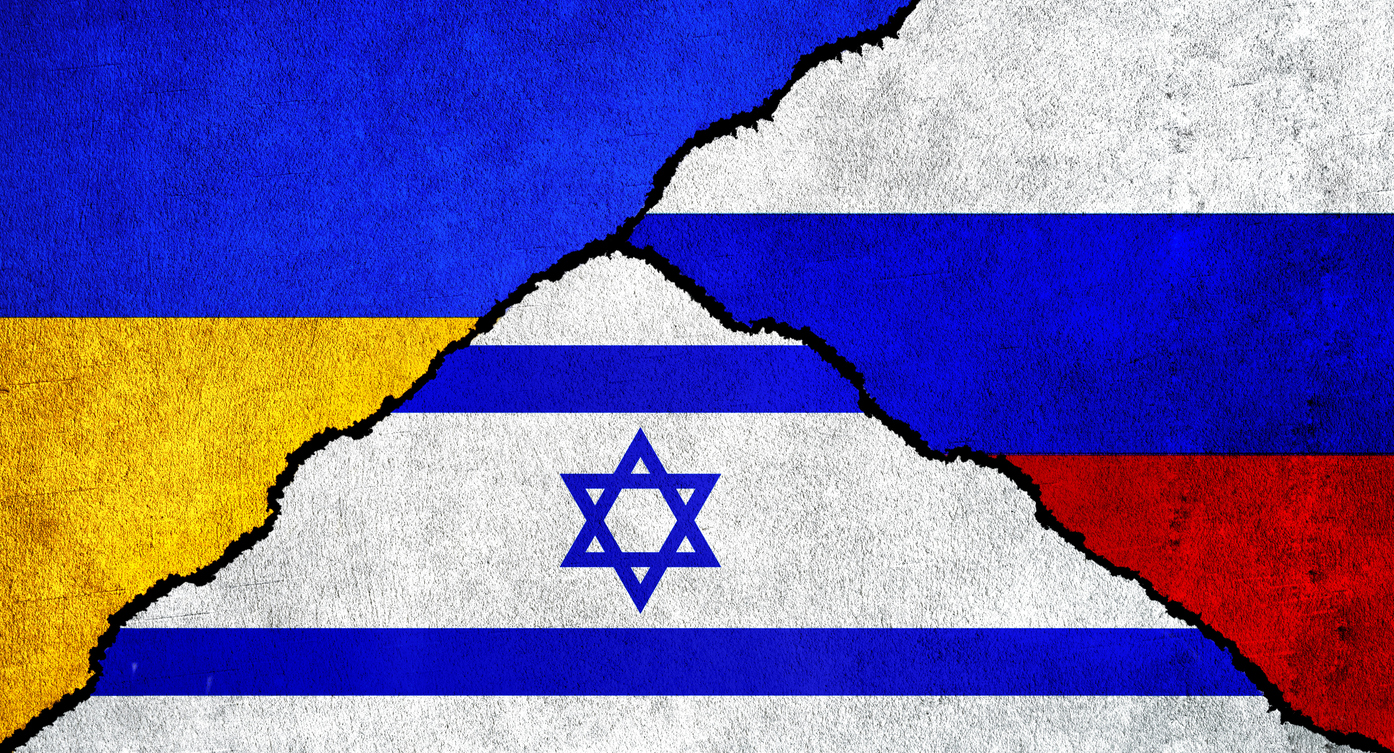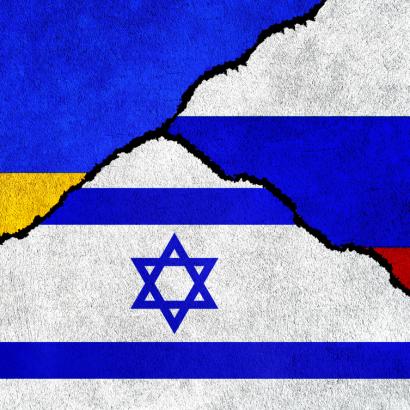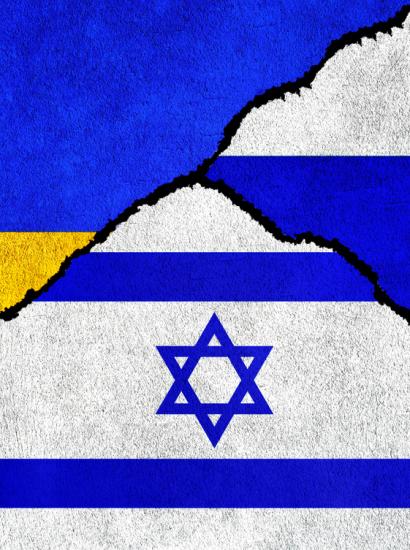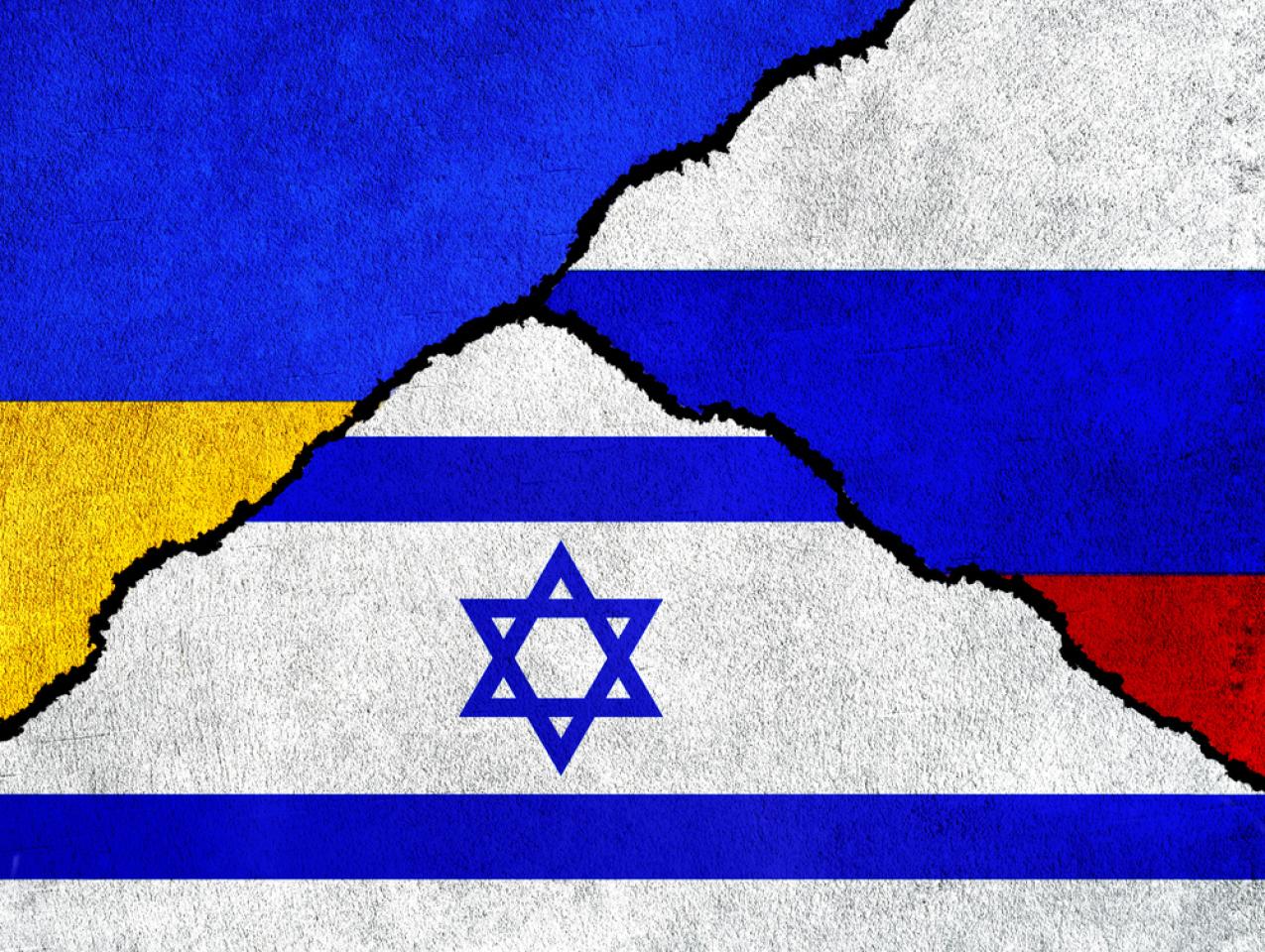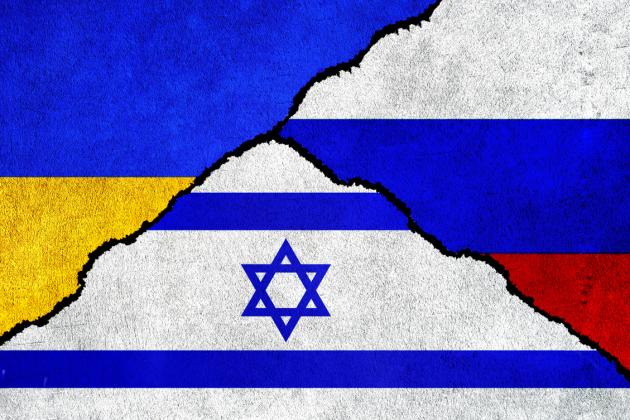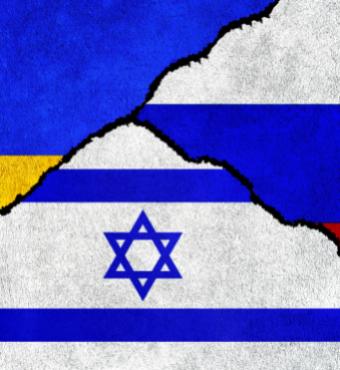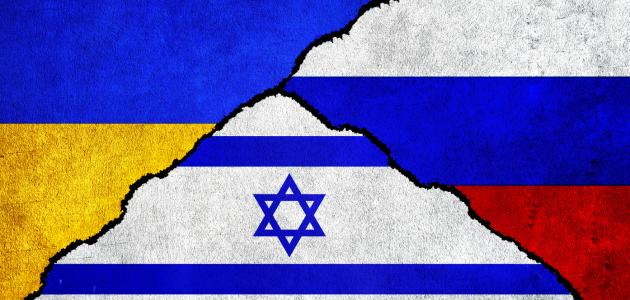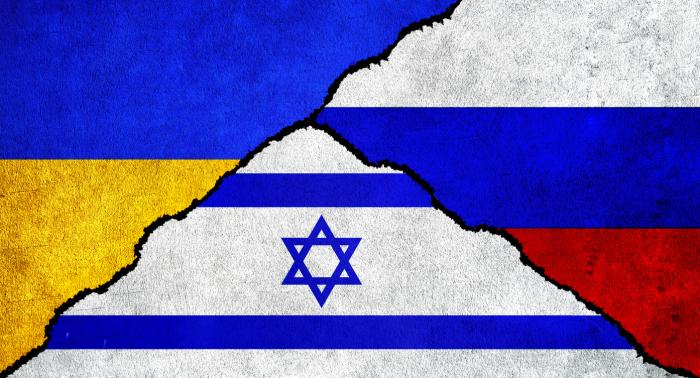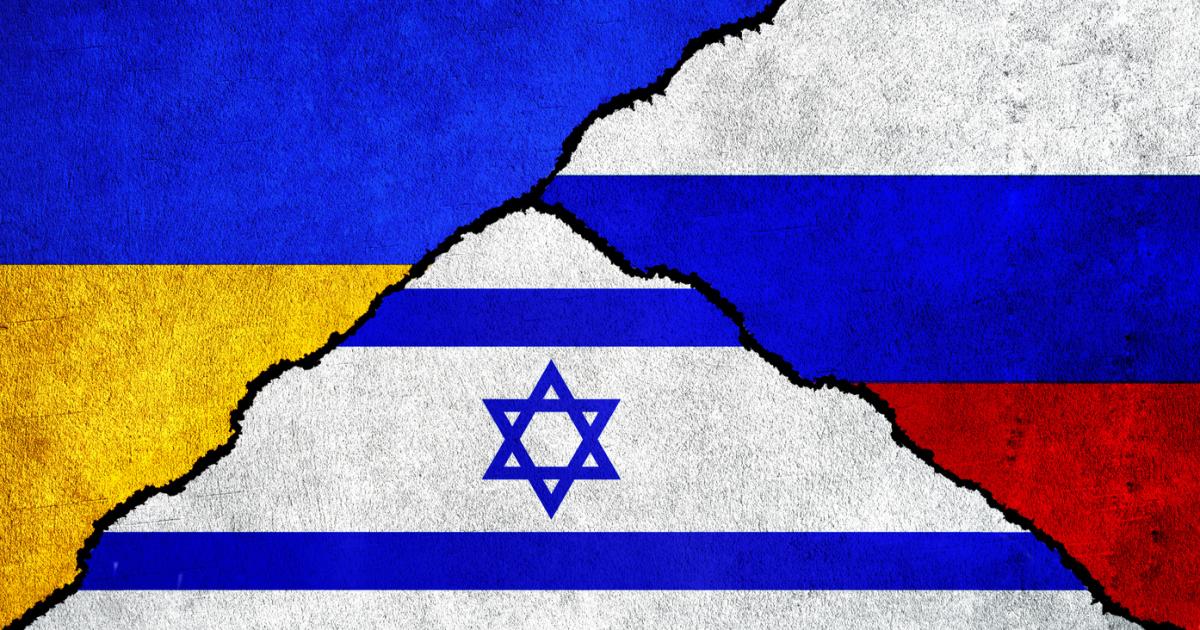- History
- Determining America's Role in the World
Since Russia expanded its invasion of Ukraine in February 2022, Kyiv and its Western partners have not stopped wondering why Israel, one of the United States’ closest partners, is not willing to assist Ukraine with lethal weapons, whether air-defense or kinetic offensive systems. One of the main arguments raised in Jerusalem during 2022–2024 was that the Russian military presence in Syria had been a significant, if not decisive, consideration for Israel. The Israelis were concerned that if they were to send lethal arms to Ukraine, Moscow would retaliate in Syria, either by having Russian weaponry transferred to Israel’s enemies—or, by staging a direct military clash between the two air forces.
The fall of the Assad regime in Syria at the end of 2024, which led to the departure of pro-Iranian forces from the country and a dramatic reduction in the Russian military role, was supposed to change the balance of Israeli considerations and lead to an increase in security cooperation between Israel and Ukraine. This did not happen and it is unlikely to happen in the near future. It’s important to understand why this shift has not taken place.
Israel’s relations with Russia and Ukraine before the 2022 Russia's invasion
In the decade preceding its 2022 invasion of Ukraine, Russia became a central player in Israel's national security strategy, first and foremost following its overt military intervention in the Syrian civil war in 2015. The centrality of this relationship was reflected in the intensity of Israel's diplomatic dialogue with the Kremlin. From Vladimir Putin's return to the presidency in 2012 until the Russian invasion of Ukraine in early 2022, there were 19 meetings and more than 60 phone conversations between him and the Israeli Prime Ministers and Presidents. At the same time, Israel–Ukraine relations, despite their generally positive nature, received much less attention from Israeli leadership (about five meetings and eight phone calls with Ukrainian presidents in the same period).
Since the disintegration of the Soviet Union, Moscow has remained an important interlocutor for Jerusalem on the spread of military technology and weapons in the Middle East. In the 1990s, the weakness of Russia’s export-control system allowed for the sale of unconventional and dual-use know-how to rogue actors, even as it emerged as one of the world’s leading arms producers. In addition, Russia’s role in the UN Security Council makes it a relevant counterpart for Israel on Palestinian, Lebanese, and Iraqi issues, and, of course, on the Iranian nuclear file, which became a major threat to Israel in the 2000s. Beyond security matters, a significant bilateral agenda developed around the large Jewish community in Russia, as well as trade and cultural ties.
Russia was grateful that Israel did not join the Obama administration and European countries in their efforts to isolate Moscow following its annexation of Crimea and military intervention in eastern Ukraine in 2014. While Israel did not support Russian aggression and sought to maintain positive relations with Kyiv, it saw no need to escalate its dispute with Moscow, which was becoming increasingly active in the Middle East at the time. Western pressure on Israel to disengage from a high-profile political dialogue with the Kremlin ultimately failed. 2014–2015 also marked a relatively low point in Israel’s relations with the United States and Europe, as Jerusalem opposed the negotiations with Iran that led to the signing of the 2015 nuclear agreement (JCPOA).
Thus, in 2014, while global attention was focused on Ukraine, Israel concentrated on preventing Iranian military forces from entrenching themselves in Syria. During the Syrian civil war, Iran’s Revolutionary Guards, along with Hezbollah and other pro-Iranian militias, intervened on the side of the Assad regime. Beginning in 2013, Israel launched an open-ended air-bombardment campaign against Iranian and Hezbollah targets in Syria. The Assad regime was too weak to respond, granting Israel broad freedom of action in the Syrian skies. This strategy was conceptualized as an “inter-war campaign doctrine,” designed to degrade enemy capabilities without escalating into full-scale war.
The arrival of Russian forces in Syria in 2015 could have jeopardized this campaign, which Israel regarded as highly successful and critical to countering Iran. Russia established an air base in Khmeymim and a naval facility in Tartus, deployed fighter jets, air-defense systems, electronic warfare assets, and intelligence platforms—capabilities that Israel feared could undermine its military supremacy and risk collisions between Israeli and Russian pilots in Syrian airspace.
Therefore, in 2015 Israeli Prime Minister Benjamin Netanyahu secured agreements with President Putin on a de-confliction mechanism that allowed Israel to continue striking Iranian targets in Syria without threatening the Assad regime or endangering Russian troops and assets. In retrospect, this proved effective for Israel, enabling it to weaken Iran and Hezbollah despite Russia’s military dominance in Syria. No direct Russian-Israeli military clash occurred, and the risks posed by Russian-Iranian cooperation to the Israeli Air Force remained limited.
Netanyahu’s close dialogue with Putin also gave him opportunities—ultimately futile in hindsight—to pursue diplomatic arrangements, involving the United States, Russia, and regional actors, aimed at reducing Iran’s military footprint in Syria. Though achievements were modest, contacts persisted for years, in 2015-2016, during the Obama administration and into Trump’s first term. For Moscow, ties with Israel were a potential means of easing its growing international isolation. Netanyahu's intimate contact with the Kremlin carried domestic political value: as Israel entered a prolonged political crisis between 2018 and 2021, with five elections in three years, he showcased his ability to maintain close ties with both President Trump and President Putin as a unique personal advantage over his rivals.
This policy of close engagement with Russia became a consensus in Israel’s political establishment. When Naftali Bennett succeeded Netanyahu as prime minister, he too regarded Russia as one of Israel’s key partners. His October 2021 meeting with Putin in Sochi was presented as evidence that he could step into Netanyahu’s shoes on the foreign-policy stage.
Walking Between the Drops
Israel saw the Russian invasion of Ukraine first and foremost through the prism of its own problems—the fate of the Jews in both countries and the effort to ensure that Israel's freedom of action in Syria would not be harmed. As a result, Israel began to speak with two voices: Prime Minister Bennett refrained from expressing a clear position, claiming that this was necessary to allow him political freedom of action vis-à-vis Russia, but most of his senior ministers, especially Foreign Minister (and later Acting Prime Minister) Yair Lapid, issued clear statements of support for Ukraine. Israel joined the condemnation of the invasion at the UN General Assembly, but not the Western sanctions.
Bennett believed that the best solution for Israel was to promote a mediation initiative (ultimately unsuccessful) between Moscow and Kyiv in order to bring about an end to the war. During the first month of the war, Bennett held numerous talks with Putin and Zelensky (in coordination with the leaders of France and Germany) and even became the first pro-western leader to meet Putin in Moscow on March 5, 2022. At the same time, Israel deployed a field hospital in western Ukraine, delivered nonlethal aid, and engaged in the absorption of Jews from Russia and Ukraine who had fled the war.
Under the leadership of Bennett, Lapid, and Netanyahu, Israel’s policy toward the warring sides in Ukraine did not differ significantly. Jerusalem rejected American, Ukrainian, and European pressure to transfer Israeli-made weapons to Kyiv. Israel’s reasoning for not supplying weapons was identical under all three leaders: that Russia’s response to the provision of lethal Israeli weapons to Kyiv would be to restrict the freedom of action of the Israeli Air Force in Syria and to sell weapons to the Assad regime and Iran. It was also argued that Israel could not afford to sell Iron Dome, missile and rocket defense systems, out of fear that the Russians or the Iranians would learn their technological vulnerabilities, weakening Israel’s own defense capability. It was further claimed that the specs of the Iron Dome system were not suited to the military reality in Ukraine.
Another consideration that was emphasized was the fear that Russia would take revenge on its Jewish population if Israel adopted a confrontational line toward it and helped Ukraine. Although Putin had a reputation as one of the most Judeophilic rulers in Russian history and there were many Jews in his circle of friends and associates, during the years of the war in Ukraine there was indeed a change of tone on this subject. Although the Russian government did not adopt punitive measures against Jews, criticism of Israel that spread through the Russian media often failed to distinguish between Israel and Russia’s Jews. Many prominent artists and intellectuals fled Russia to Israel because of their opposition to the war, and propagandists did not stop portraying them as traitors. And so, on the public and grassroots level, there is a sense that anti-Semitism has been on the rise in Russia since 2022.
Israel's fear of pressure on Russian Jews as a mechanism to maintain Israel's neutral policy did not go unnoticed by the Kremlin's decision-makers. In July 2022, soon after Yair Lapid—who was critical of Russia—took over as acting prime minister, replacing Naftali Bennett who was perceived in the Kremlin as a friend of Putin, a court order was issued in Moscow. It declared the closure of the Jewish Agency in Russia, one of the country's most prominent Jewish organizations. Throughout Lapid's tenure, the legal proceedings for the implementation of this decision continued and were prolonged, and they were frozen only after Benjamin Netanyahu's return to the prime minister's chair in early 2023.
Israel's stance of refraining from providing direct help in lethal weapons to Ukraine provoked public anger in Kyiv. President Zelensky tried to exert pressure on the Israeli government by appealing directly to the Knesset and the Israeli public. The Ukrainians found it difficult to understand Israel's position, since a significant part of Ukraine's political and business leadership, including President Zelensky himself, were of Jewish origin and had extensive ties to Israelis of Ukrainian origin.
Ukraine failed in arousing the Israeli public to pressure the government to help Ukraine's military needs. In 2022–2023, the majority of the Israeli public supported the "walking between the drops" approach to the war in Ukraine, i.e., neutrality with regard to warring parties (although a significant faction of the center-left camp favored greater support for Kyiv). The phrase “walking between the drops without getting wet” is a popular idiom in Jewish culture, describing a delicate balancing act—acting with caution so as not to upset any side.
In contrast to European countries, where the Russian invasion of Ukraine became an issue that stirred up public discourse, in Israel the public interest about this war faded quite quickly and moved toward internal politics and regional threats. In 2022, soon after the failure of Bennett's mediation initiative, his government encountered a political crisis. He was accused of being too concerned with grand international politics while disregarding the looming loss of parliamentary majority due to a rebellion in his own party. He left the Prime Minister's office, and the country entered another round of elections, after which it suffered a wave of unprecedented political protests and internal divisions over the controversial judicial reform. There was little room left for public interest in the war in Ukraine.
The tightening of military cooperation between Moscow and Tehran during the war, and, in particular, the supply of unmanned aerial vehicle technology from Iran to Russia, raised expectations in Kyiv and the West that Israel would change its position regarding increased security assistance to Ukraine. Israel did indeed increase its criticism of Russia on this issue, but there was no change in its military export policy.
Two days before the Hamas attack on October 7, 2023, I explained Israel's avoidance of transferring lethal weapons to Ukraine to a group of European diplomats. He argued that there was a difference in threat perception between Israel and Western countries. For Western countries, and certainly for European ones, Russia is the number one threat. For Israel, however, the prioritization of threats is entirely different: Russia is perceived as a challenge rather than an enemy, and before confronting Russia, Israel must first contend with the threats posed by Iran, Hezbollah, the Assad regime, Hamas and other hostile Palestinian organizations, the pro-Iranian militias in Iraq, the Houthis in Yemen, and ISIS. I concluded that, despite the seemingly quiet reality, Israel was sitting on a "powder keg" that could explode at any moment and as long as this remained the case, it would not be in Israel's interest to sharpen its differences with Russia.
The Russian Response to the Hamas Massacre
The "powder keg" exploded two days later. Russia was surprised by the Hamas attack and had nothing to do with it, but in Moscow's eyes, it was an advantageous development. First, it diverted international attention to the Middle East and away from criticizing Russia over the war in Ukraine to the Middle East. Second, the United States was forced to provide a great deal of military aid to Israel, ostensibly at the expense of Ukraine. Third, the United States could now be blamed by the Russian propaganda machine for the strategic myopia that led to the outbreak in the Middle East. This Russian rhetoric was aimed to "score points" in the Muslim world by criticizing Israel. Fourth, it seemed to Moscow’s decision-makers that the events in the Middle East indicated a shift in the global balance of power in Russia's favor: "The Axis of Resistance" led by Iran, Russia's partner, was supposedly demonstrating strength, despite Western pressures and its image of technological backwardness, while Israel appeared weak immediately after the attack.
Official Moscow spared no criticism of Israel and the West, hosting delegations from Hamas, Hezbollah, and the Houthis, while the Russian propaganda apparatus abandoned all restraint in virulent attacks against Israel. This response aroused sharp displeasure among Israel's top echelons and accelerated the deterioration of Israeli trust in Moscow. By contrast, Zelensky immediately and unequivocally condemned the Hamas attack, and in Ukraine there was hope that Israel would now distance itself from Russia and open possibilities for security cooperation. In practice, however, Israel’s focus on an intense, protracted multi-front war, in which air-defense systems played a critical role, led to a reduction in American and European pressure on Jerusalem to help Kyiv. While Israel did not see the possibility of granting Moscow any political role in addressing the war, it still needed continued "industrial calm" for its campaign of attacks in Syria and Lebanon, and once again, the support for Ukraine became secondary.
Towards the end of October 2023, Moscow also realized that unilateral backing for Hamas and the Iranian camp in the Middle East war was a risky gamble that did not help advance Russian interests. Russia's Sunni partners in the region viewed Hamas and its horrific actions with great hostility. Official Moscow had, therefore, scaled down its criticism of Israel, though the Russian information warfare machine, managed in a decentralized way, continued its harsh verbatim assaults against Israel.
However, this change in Moscow's position came too late to reassure Israel, and throughout 2023–2024 mutual concerns and criticism deepened. Israel feared that Russia would continue to draw closer to Iran and its proxies in the region, thereby undermining Israeli interests. Russia, for its part, suspected that Israel might change its position on the supply of offensive weapons to Ukraine as part of a reorientation of Israeli foreign policy in the post–October 7 reality. The Russians warned Israel about this publicly and officially, as well as through an influence campaign in the media and on social networks.
A thaw in hostility between Israel and Russia became apparent in the fall of 2024, when Israel shifted the fighting from Gaza to Lebanon. The targeted operation, in which thousands of Hezbollah operatives were injured in an instant; the lightning attack that "beheaded" the organization's leadership; the destruction of its missile capabilities; its helplessness in the face of the IDF’s offensive; and the interception of most of the Iranian missiles launched at Israel in April and October without causing significant damage—all of these demonstrated to Moscow even more strongly that its bet on the victory of the Iranian "axis of resistance" over Israel might have been mistaken.
As part of the campaign in Lebanon, Israel acted to prevent Iran from supplying the organization through Syria, particularly by blocking the landing of aid flights. Jerusalem sent the Kremlin strong signals not to allow Iran to land aircraft at Russian-controlled airports in Syria, and it appears that, to Iran’s displeasure, the Russians cooperated with Israel’s demands, fearing Israeli strikes on the Assad regime and Russian assets in Syria. In November 2024, a delegation of Netanyahu's senior envoys visited Moscow to discuss a possible Russian role in stabilizing security arrangements in Syria and Lebanon after the end of hostilities.
However, these ideas were never realized, since by the end of December the Assad regime had suddenly collapsed, and Iran and Hezbollah were pushed out of Syria by the new regime. Russia, drawing on years of cooperation with Turkey and the Gulf states, succeeded in preventing a full and hasty military retreat from Syria, but its military position was weakened since the al-Sharaa regime, unlike its predecessor, was not dependent on Russia for survival and did not view itself as bound by the agreements Assad had signed with the Kremlin.
A decade after the beginning of the Russian intervention in Syria in 2015, Israel no longer regards the Russian military presence as a significant operational or strategic constraint. This was well illustrated at the end of 2024 and the beginning of 2025 in a series of intensive, large-scale operations to destroy the Assad regime's military capabilities so that they would not fall into the hands of the new authorities.
Why didn't the fall of Assad bring Israeli military aid closer to Ukraine?
There have been a number of positive developments in Jerusalem–Kyiv relations during 2025, but this does not represent a fundamental change of the Israeli policy on military aid to Ukraine. On the contrary, it reflects continuity in bilateral relations.
Since the end of 2024, the media has been filled with claims that there had been a shift in Israel's policy regarding arms transfers to Ukraine. Russian concerns were heightened in the summer of 2024, when it was reported that contacts between Jerusalem and Washington could lead to the transfer of the Patriot air-defense systems to the United States, who in turn might transfer them to Ukraine.
Israel's ambassador to Kyiv, Michael Brodsky, confirmed that Israel had indeed transferred Patriot systems to Ukraine, but the Foreign Ministry in Jerusalem was quick to clarify that no such transfer of weapons had taken place. President Zelensky said on September 27, that an "Israeli system" is operated in Ukraine for one month, and that two more [Israeli?] systems are expected to arrive this fall (but refused to add more details). Israel also denied Ukrainian claims that it had decided to transfer Russian-made weapons seized from Hezbollah in Lebanon to Ukraine.
Axios reported, that the Biden administration reached an unpublicized agreement with Israel in September 2024 to transfer the Patriot systems, decommissioned by Israel early in 2024, to US hands. US DoD managed to move some of the equipment from Israel to Poland, and from there to Ukraine at the end of 2024 or beginning of 2025. The rest of the equipment was transferred to the United States, as it required upgrades before being usable for Kyiv's needs. Axios claimed that PM Netanyahu knew that the US intended to provide the Patriot to Ukraine, but it is obvious that Jerusalem agreed to this step only as a gesture to President Biden and insisted it would not be a direct participant in the supply of weapons to Ukraine.
The Trump administration leaked in May that it was promoting the renovation and transfer of the Israeli batteries to Ukraine in an attempt to pressure Putin to compromise and reach a cease-fire in Ukraine. However, it seems that Israel has had no role in this issue since the end of the Biden administration.
The Israeli Foreign Minister Gideon Sa'ar visited Kyiv in July 2025, the first such visit since Foreign Minister Eli Cohen’s trip during the early days of the Netanyahu government in 2023. During the visit, Sa’ar condemned Russian attacks on Ukrainian civilians and agreed to establish a strategic dialogue between the two countries on the issue of Iran. According to Zelensky, options for security cooperation were also discussed. In 2025, Netanyahu spoke with Zelensky twice (January and August), compared to once in 2024.
In practice, the recent contacts of Sa’ar and Netanyahu with their Ukrainian counterparts are connected more to internal Israeli politics than to some policy change on security assistance to Kyiv. Both have been primarily concerned with having Kyiv ease the pilgrimage of tens of thousands of Israelis on Rosh Hashanah to the grave of Rabbi Nachman of Breslov in the town of Uman in central Ukraine. This event is of great importance to the religious and conservative electorate in Israel, and therefore to the stability of Netanyahu's coalition government. Both the Bennett and Netanyahu governments worked throughout the years of the war with Kyiv, Moscow, and other capitals to ensure this custom could be observed despite the ongoing conflict in Ukraine.
Paradoxically, the removal of Russian leverage in Syria did not lead to a distancing between Israel and Russia. On the contrary, in 2025 the political dialogue between Putin and Netanyahu intensified (four phone calls, compared to none throughout 2024). In February 2025 it was even reported that Israel was lobbying Washington to help Russia keep its military bases in Syria.
However, this is not as paradoxical as it might seem, since the reduction of the Russian military threat in Syria coincided with four other major changes in Israel's strategic environment which intensified Jerusalem's interest in tightening ties with Moscow—regardless of the war in Ukraine, which itself remains a relatively marginal issue on Israel's public agenda.
The primary matter involves the Netanyahu government’s desire to seize the opportunities presented by the Trump administration. As early as November 2024, while fighting Hezbollah, Jerusalem understood that the Trump era would include efforts at détente with Moscow. Even before the Russian invasion of Ukraine in 2022 Netanyahu had recognized that intensive contact with both Putin and Trump could expand his room for diplomatic maneuvering. Now, he realized that political circumstances might allow him a further opportunity to give concrete substance to the general aspiration of normalizing Moscow–Washington relations. Putin, unwilling to compromise on a Ukraine cease-fire, seemed to be ready to benefit from presenting the Trump administration with opportunities for coordinating moves in the Middle East with Washington, Jerusalem, and other regional actors in order to build a positive agenda aimed at normalizing relations with the United States, while deepening rifts between it and the European countries. In addition, Trump reversed the Biden administration’s policy which had expected (and sometimes even pressured) Israel to align itself with Western security assistance to Ukraine and distance itself from Russia.
Secondly, the Israeli–Iranian conflict escalated, as Tehran approached the nuclear threshold, and as Israel prepared for an attack on Iran’s nuclear and missile programs. Israel sought to halt the Russian–Iranian rapprochement that developed during the years of the Ukraine war and to prevent Russian assistance in upgrading Iranian air-defense systems. These systems had been proven vulnerable in Israeli strikes in April and October 2024 in Iran, during which long-range, Russian-made S-300 systems were neutralized. Had Russia helped refurbish these systems (or provided other advanced platforms, such as SU-35 fighter jets) before the attack, this would have added operational challenges to Israel’s strike plan. However, during the "Twelve-day War" Russia maintained a passive attitude and limited itself to condemning Israel and the United States, even though it was reported to have aligned itself with the Israeli-American demand for zero uranium enrichment by Tehran. Israel would like to distance Russia from Iran, so that Moscow might agree to freeze Iran’s nuclear program and transfer any highly enriched uranium that survived the Israeli attack to Russian territory. The Iranian nuclear issue is of utmost importance to the Netanyahu government, and therefore it is critical to reduce Russian backing for Iran at a time when Netanyahu, together with Trump and the European Union, is attempting to intensify pressure on Iran’s Supreme Leader.
Thirdly, the balance of power in Syria following the fall of the Assad regime shifted dramatically. Turkey, which possesses the second most powerful army in NATO and has in recent years become one of Israel’s fiercest rivals, has emerged as the decisive influence over the al-Julani regime that is viewed in Jerusalem as a rising new strategic threat. The increased Turkish military presence in Syria—long regarded by Israel as a "no man’s land"—could turn the country into a stage for an Israeli–Turkish military confrontation. Some in Israel believe that a continued Russian military presence in Syria would diversify the supporters on which the new regime relies, reducing Turkey’s dominance. This argument is not supported by the fraught but pragmatic history of Russian–Turkish relations since 2016: despite recurring tensions and conflicts of interest, Putin and Erdogan have repeatedly managed to reach understandings. It is therefore conceivable that Moscow and Ankara could strike compromises on Syria at Israel’s expense. In any case, the fact that Russia, which fought brutally against al-Sharaa and its partners during Assad’s rule, has managed to retain, at least provisionally, its coastal bases reflects its enduring levers of influence over Damascus. Russia can help the new regime bolster its legitimacy and supply food and energy to the country. In addition, al-Sharaa appears to expect some security guarantees with respect to Israeli attacks in Syria.
The fourth change is the deterioration of Israel’s relations with European countries, against the backdrop of disputes regarding Israel’s actions in Gaza and the broader Israeli–Palestinian conflict. The rise in European security concerns after Russia’s invasion of Ukraine initially led to greater defense imports from Israel and greater understanding for Israel’s offensive moves following October 7th massacre. But over the past year, the gap has widened: European sanctions have been imposed on some Israeli entities, and future prospects point to deepening hostility and reduced European leverage on Israel. Among Israel’s Western partners, the Europeans have the greatest interest in strengthening Ukraine’s security and possess significant potential leverage over Israel. However, the Palestinian issue overshadows all other aspects of Israel–Europe relations, severely limiting Europe’s ability to press Israel for greater security assistance to Ukraine, even indirectly.
Conclusions
The way the war in Ukraine ends will shape the new security architecture in Europe and influence the emerging global order. Yet Israel, which has been at the epicenter of a perfect storm for the past two years, remains primarily preoccupied with unprecedented internal crises and regional wars. The Israeli public and its leadership have little attention to devote to foreign affairs not pertaining to their direct interests. In today’s cynical world, where leaders question every norm and rewrite history for political ends, moral arguments and passionate calls for Israel to be on the "right side of history" have very limited impact.
More than three years after the Russian invasion of Ukraine, Israel’s leadership remains unmotivated and under little pressure to deviate from its neutral stance on the conflict. While most of the population and leadership has sympathy for and identifies with Ukraine, and is willing to support it in non-military domains and entertains no illusions about the nature of the Russian regime, they also recognize that Russia retains far greater capacity to harm Israel or create opportunities (to pressure Iran or attempt to play a role in bringing Moscow and Washington cooperate in the Middle East).
An examination of the main considerations influencing Israel’s approach indicates that it is highly likely, in the coming year and perhaps beyond, that Israel will generally continue to adhere to neutrality in the Russia–Ukraine war. In November 2026 (if not earlier), important Knesset elections will take place, forcing the public to cast a vote on the major issues that have divided Israel’s internal arena in recent years: political responsibility for the October 7 disaster and judicial reform.
Electoral considerations will increasingly dominate the Israeli government's decision-making, potentially strengthening Russia's hand. This doesn't mean, that supporting Russia has any significant electoral effect, even among the Russian-speaking Israelis, but bluntly put, helping Ukraine generates virtually no votes for any camp in Israeli politics.
At present, the aforementioned four principal factors influencing Israel’s policy on the Russia–Ukraine war seem to support continued neutrality more than any deviation from it. The Trump administration’s zigzagging on its Russia–Ukraine war policy signals to Jerusalem that working with the Kremlin carries no political risks; Iran and Turkey continue to pose burning challenges for Israel; and the deepening of disagreements between Israel and the Europeans over the Palestinian issue means that Ukraine’s staunchest supporters have lost their leverage over Israel.
A change in Israel’s position on defense cooperation with Ukraine will require a shift in one or more of these considerations. A change of government in Israel, whether following elections or due to a political crisis, could lead to a reassessment of Russia’s place in Israel’s national security strategy. Yet those seeking to challenge or succeed Netanyahu have not distinguished themselves from him on policy toward Russia.
If the Trump administration were to adopt a strong anti-Russian stance due to the Kremlin’s refusal to end the war in Ukraine (or for other reasons), the Netanyahu government’s freedom to maintain a public dialogue with Moscow could be curtailed, given Israel’s increasing dependence on the United States and the Republican camp. Netanyahu might again attempt to mediate between Moscow and Washington but could find this option too risky. In such a constellation, Israel might consider focused steps to increase support for Ukraine—in close coordination with Washington. In any case, Israel might be less restrained in indirect or covert format of military cooperation with Kyiv, which has a lot of operational experience to share.
Reaching an agreement on the Iranian nuclear issue (with or without Russian involvement), the nature of Russian–Iranian or Russian–Syrian security cooperation, the collapse of the al-Sharaa regime or if it demands Russia withdraw from Syria, or an end to the war in Gaza—all these developments could affect the possibilities for Russian-Israeli cooperation. Criticism of Israel or of Netanyahu personally, whether from Moscow or Kyiv, will also have an impact, especially during an election period. At the same time, if Ukraine should suffer mounting defense difficulties, these are more likely to deter Israel from expanding aid to Kyiv than to spur it to accelerate assistance.
Israel will continue to walk along a "very narrow bridge" between Russia and Ukraine (and their partners), as the well-known Israeli song puts it, echoing the words of Rabbi Nachman of Breslov. Instead of providing kinetic military aid to Ukraine, Israel is likely to be helpful to Kyiv in other domains, heeding to the Rebbe’s advice to "not be afraid at all" and maintain unshaken optimism—like his followers who reach emotional-religious ecstasy during their pilgrimage to his gravesite in the heart of Ukraine.
Daniel Rakov is a Senior Fellow in the Jerusalem Institute for Strategy and Security (JISS), dealing with Russia's strategy in the Middle East.







